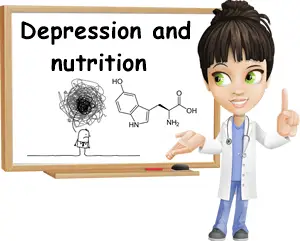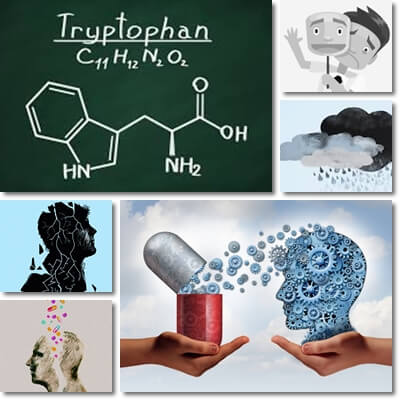Pronounced nutritional deficiencies cause the most varied of diseases, disorders and physical ailments. However, the reach of nutritional deficiencies is even more extensive than physical health, affecting mental health with the same frequency and severity. Realizing this is but a simple exercise of logic: mental health has its roots in the physical, with organs such as the brain, systems such as the nervous and endocrine system being the starting point of a healthy perspective on life, healthy attitudes and reactions towards external events, emotional stability, productivity, career growth and overall healthy relationships.
The start of the decade has seen a growing interest in how nutrition and especially vitamins, minerals and other essential and non-essential nutrients impact mental health. Research shows there are connections between various nutrients and many forms of mental illness. The impact of nutritional deficiencies on mental illness is considerable and depression sufferers in particular report seeing improvements in their symptoms after reversing existing nutritional deficiency. And while taking dietary supplements and improving your diet does not exclude the need for medication, counseling and support, good nutrition has certain benefits and is a fail-proof tool for the treatment of depression.

Protein deficiency and depression
How are these two connected? Well, there is a theory that states amino acids from protein are what may be missing in the diets of depression sufferers. We all know that quality protein containing all essential and many non essential amino acids is found in animal products for the most part. For some people, getting enough protein in their diets is difficult. This can come about because of financial reasons, meat being an expensive item, moral beliefs translating into a vegetarian or vegan lifestyle, or because of the lack of nutritional education regarding the importance of meeting your minimum daily requirements for essential nutrients in order to preserve good physical and mental health.
Why are animal products so important for depression? Because unlike plant food sources, animal products contain amino acids the human body cannot make itself but requires in order to function at optimal levels. As such, meat products, and I’m not talking about cold meats or any form of processed meat products, but about actual chunks of beef, chicken, fish or other meats, organic dairy, milk and eggs are crucial sources of essential amino acids that regulate hormone production, neurotransmitter synthesis and thus impact nervous system, endocrine, mental and emotional health.
To better understand this, let’s take the example of the amino acid tryptophan. It is essential, meaning you need to get it from your diet and you need it to be healthy. In addition to cheese (Parmesan, cottage cheese, cheddar cheese), meat, yogurt, pork, beef, fish, lamb, chicken and turkey, other dietary sources of tryptophan include plant food sources like sesame and sunflower seeds, oats, rice and quinoa.

What tryptophan does is help make serotonin and melatonin. Serotonin is a neurotransmitter that regulates mood, sleep, appetite, impacts memory and learning. A dietary deficiency of tryptophan-rich foods causes imbalances in serotonin levels and can result in poor mood, persistent feelings of sadness, moodiness and other negative feelings, all classic signs of depression.
A serotonin imbalance affects appetite and sleep and can result in lack of appetite and weight loss commonly seen in depression sufferers as well as insomnia or excessive sleepiness (hypersomnia). Furthermore, the amino acid tryptophan helps synthesize melatonin, also known as the sleep hormone. As its name suggests, melatonin regulates sleep-wake cycles, but its synthesis can be affected by a lack of the amino acid in the diet, potentially resulting in a disruption in normal sleeping patters consistent with depression symptoms.
Another example of an amino acid that impacts depression and mental health in general is tyrosine. Tyrosine is a non-essential amino acid and it’s found in a variety of high protein foods such as beef, pork, turkey, chicken, fish, eggs, milk, cheese and plant-based sources of protein such as legumes, pumpkin seeds, sesame seeds etc. In other words, it is pretty easy to meet your daily requirements and, in case you don’t, the human body can synthesize it from other compounds.
Similar to tryptophan, it helps synthesize neurotransmitters in the brain. Tyrosine helps make the neurotransmitters dopamine and norepinephrine, both of which play a crucial role in mental health. In depression, a steady, sufficient production of the two neurotransmitters helps prevent and reduce symptoms such as tiredness, fatigue, foggy thinking (brain fog), apathy, lack of motivation and inability to experience happiness from activities that were once enjoyable.
This also explains why physical exercise is reported to be beneficial for some depression sufferers. Norepinephrine and dopamine are considered some sort of stress promoters, raising blood pressure, heart rate, alertness, releasing energy and increasing blood flow to muscles to prepare them for action. These are typical examples of how the human body prepares to react to immediate danger. However, someone suffering from depression has lower than normal levels of the two neurotransmitters and, as a result, may experience lethargy, fatigue, overall slow reactions thinking and moving. Physical exercise naturally elevates levels, helping combat these symptoms of depression.
And now to get to the big question in everyone’s minds: is it better to get your amino acids from dietary sources (high-protein foods) or from dietary supplements? While it may be tempting to think that a tablet can meet some of our most elusive nutritional demands, it’s actually better to get the amino acids that you need from food sources. This is because all nutrients act synergically, meaning they collaborate in regulating each other’s effects in the body. This includes competing for absorption or favoring it.
In other words, in order to maximize or even ensure the minimum level of absorption of a certain nutrient and allow it to produce its benefits, you need to make sure you get enough of other nutrients that help it do so. Amino acids from a bottle cannot pass the blood-brain barrier by themselves efficiently and may result in poor bioavailability, which is the main reason why most supplements don’t work for many people. It’s the same principle that applies to fat-soluble vitamins like vitamins A, D, E and K which require you to eat some fats for the body to be able to absorb them efficiently.
Conclusion
Mental illness is a complex aspect of health, one which requires an integrated approach, patience and the support and understanding of all parties involved. Nutrition in particular is a key aspect of depression management, one that is neglected often. Studies show that in addition to healthy Omega-3 fatty acids, vitamins and minerals, protein remains an important element for preventing and potentially managing depression as the amino acids that make it up have a direct impact on the nervous system, promoting the synthesis of neurotransmitters which regulate mood.
